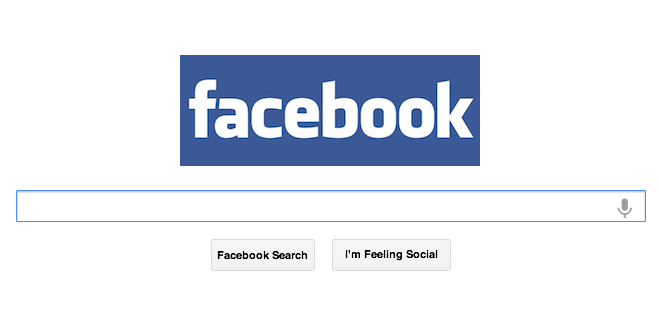Facebook’s share price has rocketed up from $19.46 to $22.00 since Mark Zuckerberg talked at TechCrunch Disrupt Tuesday, and numerous sources in the investment community tell us it was his declaration that Facebook will tackle search that excited them most. Rather than incremental increases in revenue that better ad units could bring, the prospect of the social network taking on a whole new business offers an upside worth betting on.
But what would Facebook search look like? Not a straight-up, standalone search engine say experts and a Facebook employee. But that doesn’t mean Facebook’s double-down on search won’t threaten the mighty Google.
Here’s Zuckerberg’s entire discussion of search from his Disrupt talk.
Search is interesting. We do on the order of 1 billion queries a day and we’re basically not even trying. Today with search the vast majority of it is people trying to find people, but there’s also a meaningful portion of queries where people are trying to find Pages, brand Pages, other business Pages — so there’s a bunch of that that actually does link to commercial behavior, and I think there’s a big opportunity there and we just need to go do that.
But you know search is interesting. It’s going in an interesting direction. The legacy around search is you get these search engines like Google and Bing and what Yahoo was doing before. You basically type in keywords and the search engine runs some magic to tell you what it thinks the answer is that matches your keywords. But I think search engines are really evolving to give you a set of answers, not just ‘type in something and show me some relevant stuff’, but ‘I have this specific question, answer this question for me’.
When you think about it from that perspective, Facebook is pretty uniquely positioned to answer the questions people have. What sushi restaurants have my friends gone to in New York in the last six months and Liked? Or which of my friends or friends of friends work at a company that I’m interested in working at because I want to talk to them about what it’s going to be like to work there? These are questions that you could potentially do at Facebook if we built out this system that you couldn’t do anywhere else. And at some point we’ll do it. We have a team working on search.
But don’t expect to be querying Facebooksearch.com anytime soon. Instead, signs point to Facebook expanding the functionality of its internal search engine to answer more of the questions you might Google.
Facebook Search Is All About Answers, Not Results
When you need to dig up an old website or specific nugget of information, Google’s deep index of the world’s hyperlinks will likely continue to be your go-to. But a big slice of the 3 billion or so search queries Google sees each day are essentially looking for opinions and subjective answers, not facts.
 This is where Facebook could take advantage of the data inside its walled garden that Google can’t get to, and why Google has scrambled to build its own social network over the years. The answers to the sushi question or which friends work where can’t be found in links. They’re found in check-ins, photos, biographical data, and stories published to friends — content and information firmly in Facebook’s grip.
This is where Facebook could take advantage of the data inside its walled garden that Google can’t get to, and why Google has scrambled to build its own social network over the years. The answers to the sushi question or which friends work where can’t be found in links. They’re found in check-ins, photos, biographical data, and stories published to friends — content and information firmly in Facebook’s grip.
Bing saw the writing on the wall, building its marketing around solving “search overload” you get from reams of links produced by Google. It too sought to provide answers instead, but it didn’t have the data to succeed. At least not until it got into bed with Facebook, who now provides it access to profile data, and photos, but not necessarily everything it needs.
That partnership could be a stop-gap solution until Facebook can answer these questions itself. So what will it look like? One Facebook employee I spoke to thinks the existing search bar at the top of every Facebook.com page will blossom into a more full-fledged search engine. Experts in the Facebook Social Marketers group concurred, with Brian Carter, the author of The Like Economy, noting that “If FB integrates [search] into FB user experience…they will steal share from Google.”
So rather than a new look to the search box itself, expect a revamped answers page. Later on Facebook may create a supplementary standalone site, but considering the current traffic to Facebook.com, it makes sense for search to live there.
This strategy also fits well with Facebook’s shift to mobile and the restrictions of the smaller screen size. A Facebook search box is always available from the navigation menu in its apps, so it would just need a better mobile search results page too. Since it’s harder for us to click through a stack of links to do research on mobile, Facebook’s answers over results format may also trump Google for those on the go.
The Cha-Ching Of Changing Behaviors
When we search for answers, we’re primed for persuasion by ads. Purchase intent is coveted by advertisers, and nothings says “I want to buy something” like a search for “where should I buy this?”
Facebook Exchange retargeted ads and its first non-social news feed ads may be somewhat titillating to Wall Street. However, we’ve heard from multiple investors and those in the financial industry that the potential for Facebook to serve ads next to or above search results, not just in the search typeahead, is what has people buying $FB.
![]()
Eventually, the challenge may not be building a Facebook search engine, but getting us to use it. A subtle evolution of Facebook’s existing search box rather than some flashy new site may make it more difficult to re-route our searching behaviors. When you have a question about facts or opinions, we’ve all trained ourselves to pop open a new tab or reach for the ever-present Google box in our browsers and do a search.
Facebook is already slowly trying to convince us it can handle a wider range of queries. In June it changed the call to action in its internal search box from “Search” to “Search for people, places and things.” A little gray text won’t be enough to break our most fundamental web browsing habit, though. For that, Facebook will need some serious social engineering.
